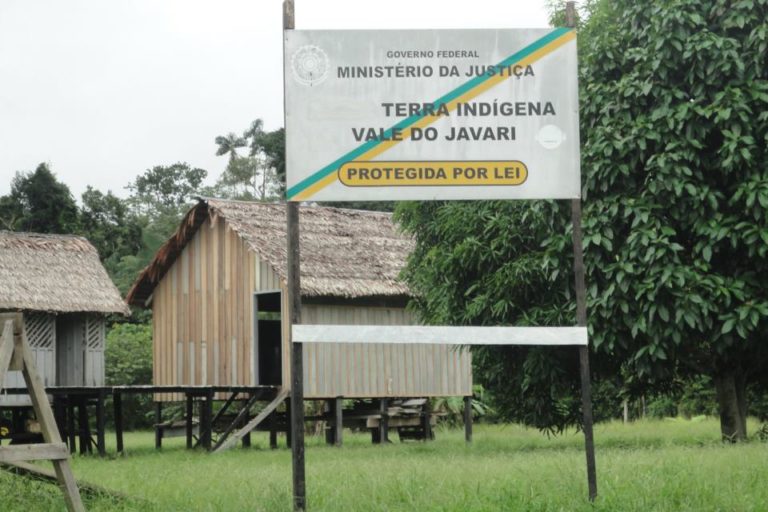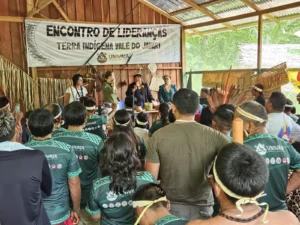Brazil judge blocks appointment of missionary to indigenous agency
COWIE, Sam. Brazil judge blocks appointment of missionary to indigenous agency. Mongabay
Disponível em: Link. Acesso feito em: 26/05/2020.
A Brazilian judge has blocked the highly controversial appointment of a former Christian Evangelical missionary to head FUNAI’s isolated and recently contacted indigenous tribes department. FUNAI is Brazil’s federal indigenous affairs agency.
Ricardo Lopes Dias, an anthropologist and Evangelical pastor, was picked to head the department in February amid a barrage of criticism. He was a long-time missionary with New Tribes Mission (recently renamed Ethnos360), a fundamentalist Christians group notorious for past attempts to contact and convert isolated indigenous people.
Indigenous groups and their advocates celebrated the court decision, with one leader saying: “It’s a really important victory, not just for indigenous [people] of the Javari Valley [Reserve in Amazonas state where most of Brazil’s isolated groups are located], but for all those who respect rule of law.”
As COVID-19 continues spreading into the Brazilian Amazon, already infecting at least 500 indigenous people, FUNAI still hasn’t presented a contingency plan to deal with Coronavirus outbreaks in the region, or among isolated indigenous groups, another factor that weighed on the judge’s decision to block Dias’ appointment.

This isolated uncontacted indigenous group in the Brazilian Amazon is clearly hostile to the helicopter hovering overhead. Photo credit: TravelingMan on VisualHunt / CC BY-NC-ND.
Indigenous leaders and advocates in Brazil are celebrating a judge’s decision to block the controversial appointment of an Evangelical missionary to oversee protection of isolated tribes in the country’s Amazon states.
Last February, in a move that drew outcry from domestic and international observers, Ricardo Lopes Dias, an anthropologist and Evangelical pastor, was picked to head the isolated and recently contacted tribes department at Brazil’s indigenous agency FUNAI, giving him access to detailed information on more than 100 registered isolated groups.
Evangelical Christians and religious lawmakers form a significant political support base for President Jair Bolsonaro who has repeatedly called for indigenous reserves to be reduced and opened up for agribusiness and mining.
The appointment is “nothing more than a plan to please Evangelical fundamentalists who make up the government’s base,” said Beto Marubo, president of the Javari Valley Indigenous Peoples Union, an organization that had called for, and helped organize for, Dias’ departure.

Last Thursday, appellate judge Antonio Souza Prudente overturned the nomination of Dias at the request of Brazil’s Federal Prosecutor’s Office that warned of possible “genocide” and “ethnocide” — the destruction of a people’s culture — if missionary groups had access to sensitive data on isolated tribes.
“The judge was very clear about Dias’ incompatibility for the job,” Antenor Vaz, an international consultant on isolated tribes and former FUNAI coordinator, told Mongabay. “His religious profession goes totally against constitutional and international norms with regard to isolated indigenous.”
In his decision, Judge Souza Prudente wrote Dias’ appointment presents “conflict of interests” and “a high degree of risk to the consolidated policy of non-contact with (indigenous) populations and respect for voluntary isolation.” The non-contact policy has been in place at FUNAI for decades.
Dias previously told the O Globo newspaper he never planned to use the position to evangelize indigenous people and alleged religious discrimination regarding the controversy over him taking the job.
He spent ten years at New Tribes Mission, which has since changed its name to Ethnos360, a group of fundamentalist Christians notorious for past attempts to contact and convert isolated tribes in the Amazon.
Mongabay recently reported on the group’s suspected plans to use a helicopter to contact and convert isolated tribes in the vast Javari Valley Indigenous Reserve in Amazonas state, where the highest number of Brazil’s isolated tribes are concentrated.
“It’s a really important victory,” Beto Marubo told Mongabay. “Not just for indigenous of the Javari Valley, but for all those who respect rule of law.”

Edward Luz, President of New Tribes Mission of Brazil with the Ethnos360 helicopter which the Evangelical group planned to use to contact isolated indigenous groups, until the plan was banned by a Brazilian court. Ricardo Lopes Dias was a missionary with New Tribes Mission for ten years. Image found in an NTM press release.
For more than three decades Brazil has adopted a “no-contact” policy in line with international protocol. Isolated indigenous groups are extremely vulnerable to diseases like flu and measles.
The judge’s decision comes amid a growing indigenous health crisis as Covid-19 tears through tribal communities, with infections and deaths increasing daily.
But FUNAI still hasn’t presented any contingency plan to deal with Coronavirus outbreaks in the region, or among isolated indigenous groups, another factor that weighed on the judge’s decision to block Dias’ appointment.
The judge also cited another judicial order given last month that banned three North American missionaries from the Javari Valley reserve, citing Covid-19 fears.
In an email to Mongabay, FUNAI described the judge’s decision as “fanciful” and alleged religious persecution against Evangelical Christians. “This Coordination was historically occupied by Catholics who were militants or sympathetic to liberation theology,” it wrote. FUNAI said it would comply with the decision but would appeal to higher courts.

Indigenous people from the Javari Valley Reserve, Amazonas state, attend a meeting. The region has the highest number of isolated indigenous groups in Brazil. Image courtesy of CIMI.
The judge also annulled a special ordinance order, created by FUNAI’s president Marcelo Xavier, which enabled Dias to take the job leading the isolated indigenous tribes department. Xavier is a federal police officer from the agribusiness-dominated state of Mato Grosso and is strongly connected to ruralista politicians, including land affairs secretary Nabhan Garcia.
According to Antenor Vaz, FUNAI’s internal protocol requires that only people within the indigenous affairs agency with relevant experience take highly sensitive positions, such as leading the isolated indigenous department, and that with the ordinance order annulled, Dias’ replacement would have to fit this profile.
But the same day as Dias’ appointment was suspended, a bill was passed in Brazil’s lower house that set emergency measures for Brazil’s indigenous people during the pandemic, such as food provision, but also included a section allowing religious missionaries to remain on isolated indigenous lands.
“If the decision of the judge [revoking the Dias appointment] was a victory, well now here comes another setback,” said Vaz.
The amendment to the bill was last minute and its insertion was organized by Evangelical lawmakers. In a response, the Coordination of the Indigenous Organizations of the Brazilian Amazon (COIAB) described the inclusion as “sneaky,” adding that, “The invasions of missionaries always brought tragedy and death for our ancestors that were forced into contact and it won’t be different now.” The bill will now go to the Senate where it needs 41 votes to pass.
“It’s yet another attack on the rights of indigenous people,” said Beto Marubo.

Evangelical pastor and anthropologist Ricardo Lopes Dias paddles a traditional indigenous dugout canoe. Image found on Facebook.






